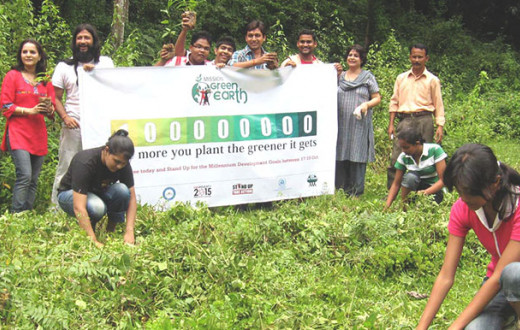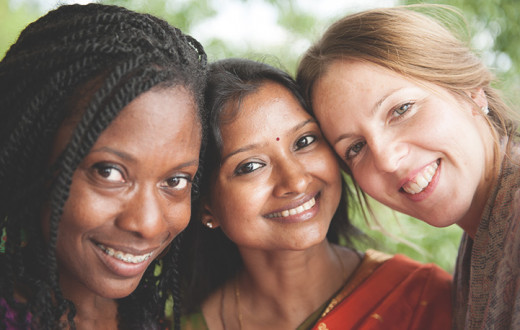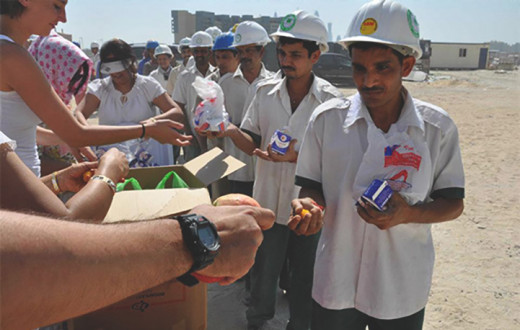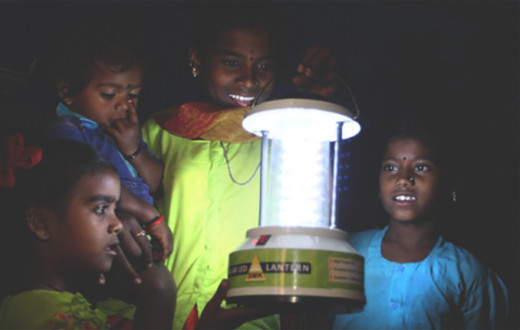"Hello Sir, there are these people roaming around in our village, we think they are Maoists, please come soon....." This was the desperate call made to the police by the villagers. They came, four to five men in uniform, and after an inquiry took the group of boys to their camp instead of the police station. It was evening, the people in the camp had gathered around in the opening when they heard a vehicle screech and stop. Walking in with their friends were the cops. Bewildered, they saw the senior officer walk right through, and what happened next no one could fathom, especially Srimant, sitting in a corner he watched the officer in utter disbelief. The senior officer was weeping, tears flowed down his seasoned cheeks staring at a framed picture of a smiling bearded man kept on a chair, he couldn’t stop weeping. It was a picture of Gurudev Sri Sri Ravi Shankar. Srimant knew nothing about Gurudev, but seeing the officer break down, only one thought came to his mind, 'if this senior inspector is weeping just by looking at his picture, how would it be to see him face to face..' Srimant didn't care about anything else, he had to meet him, he had to take darshan of Gurudev.
"I was of a different type," says Srimant in between an infectious smile. Casually brushing the long strands of hair from his chiseled face, he tells me about his growing up years in Ghatsila, a village in remote Jharkhand, infamous for Naxal and Maoist activities. "And when I say different I mean completely different. I was a rebel, a non conformist, aggressive and violent. So much, that if anyone would talk hard on me or talk nonsense, I would smack them across the face, and my karate trained blue belt hands would surely hurt them," he continues, gathering his thoughts in retrospect. "After my father died I became a vagabond. Roaming around the whole village with boys of my age or younger, disregarding school and education instead sipping alcohol, my mother had almost given up on me. It was my uncle who tried to put sense into my hot blooded brain. He told me to stop hanging out with losers and become self independent. He told me to befriend important people, ones who enjoyed significant posts in the village and the town, ones with political influence. He told me that the most important thing was 'taaka' ('money' in Bengali), and I should do something that would give me lot of money. But what would give me lot of money? It came to me at once that I should become a contractor. I started visiting the village block, made contacts with people with power and influence and in course got into rural politics. I was just a teenager."
"Slowly, my presence was felt in and around the village. I was asked for and sought after by locals and outsiders alike. I got a reputation of some kind of anti social element. During every election the cops would come to me and tell me that if anything went wrong in the village they would pick me and lock me up. I was infamous, and I failed to understand why. I knew I was not a bad person, I just couldn't tolerate injustice and would stand up against any kind of injustice in the village which would get me into unnecessary trouble. I decided; I don't want to get into trouble anymore, instead I wanted to be of service to people and started thinking of ways in which I could help them. I worked with the 'gram sabha' to help retired people get their pension on time, and through politics I started working for the village. I organized a fair in the village every year for four years, all the time being under the radar of the cops. I started teaching young kids, telling them the importance of trees, water and manure. I would still get into fights sometime, like I did when I went with a group of people to oppose a group of men who were going to cut trees in large expanses of the jungles. Even though my family had almost disowned me, I didn't care, I knew what I had to do. Slowly the Naxals and the Maoist started visiting my house. They would have long discussions with me, they wanted me to work for them. I made it clear to them that if it was for the good of the society I would help, if not, I won’t."
Years went by, and one day during the year 2000, a dear friend of Srimant went and told him about the YLTP which was happening in Patadmda for the first time, and he wanted him to do it.
"I was tending the roosters (during those days roosters were bred to fight each other, while people would bet on their favorite bird), when my friend came running to me and told me about this YLTP. I told him that I'm a karate practitioner, and I didn't need any yoga. I told him I won’t go. He kept forcing me, tears were flowing down his eyes as he was trying to explain why I should go. Exasperated, I gave in, he was my closest friend, and he had done the YLTP too. So I gathered the roosters in the coop, gave the keys to my sister and left for Patamda."
"It was winter, and the villages are cold during winter. I was thinking what am I doing in this place. I went and told the teacher that I had to go home, there was no one at home, the roosters will die, I have to go. He just looked at me and said, 'why are you worrying about things that you've left behind? You are here right now, don't worry, nothing will happen to the roosters.' I kept saying no, but couldn’t argue with him. I stayed. On the last day, the part 1 and 2 of the YLTP were happening together, and they sent the part 2 participants out, into the village to do ‘seva’ for 24 hours. They couldn't ask for food from anyone neither could they pluck any fruit or vegetables from trees or plants. If anyone invites them home, they could go. These were the instructions given to them. That was when some villagers made a desperate call to the police, they thought they were Maoists roaming around in the village...."
That evening, Srimant wept, he wept with the senior officer, he wept his heart out. "I have to meet Gurudev," that was his deep felt desire.
"I was called for ‘seva,’ and was told to do the basic course and also get ten registrations for it. I went around talking to people, but none of them agreed to fill the form. I roamed around the villages talking to people for the next 16 days, I couldn't get a single registration. One evening I came to my uncle's house, I was hungry, I hadn't eaten anything the whole day. They were cooking fish, and were passing sarcastic comments on how I've become a ‘sadhu’. I had the fish, and I fell sick. I couldn't move from the bed. I had Gurudev's picture with me, I held it close to me and asked him to forgive my mistake. Next morning, my pain was gone, without a trace. I went out and started meeting people and by the end of the day had 45 filled forms, with the registration amount in my hand. I knew he was strengthening my faith. The next course I brought together 60 people, and then 80 and then 180 on to the path. Now my faith is so strong, whatever work I set out to do, it just happens."
Srimant dedicated his life to his master Gurudev and his work. He's been with Mohan da since the beginning of the Patamda Ashram. He went to Bangalore for the 25th anniversary of The Art of Living and got to meet his master in the midst of 250000 people. He went back and met his uncle, and told him that there was something more powerful than 'taaka' which he experienced. It was the blessings of God, the grace of the Master and the love of nature. Srimant found his calling. His calling is to work for the country, to educate and make the people of rural India aware of their rights, to help them fight the habits of drugs and alcohol, to urge the Naxals to leave arms and vote, to teach them pranayama, meditation and to get them to experience the magic of Sudarshan Kriya. He believes Sudarshan Kriya is the answer to all the problems that people are facing, and it was through its experience, Srimant found salvation.








